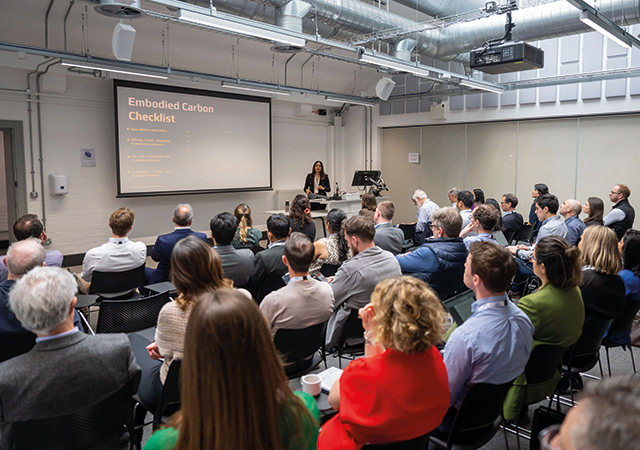
For more information and to book your place, visit www.cibse.org/ technicalsymposium. CIBSE members receive £100 off the standard ticket rate
There are only two months to go until the CIBSE Technical Symposium, which this year takes place on 24-25 April at UCL’s Bentham House, in London.
CIBSE has partnered with the International Building Performance Simulation Association – England (IBPSA-England) to combine the CIBSE Technical Symposium and IBPSA-England‘s biennial Building Simulation and Optimisation event. The theme is ‘Fit for 2050 – achieving net zero through intelligent, resilient and sustainable design in the built environment’. Below are details of four presentations on embodied carbon in heat networks, artificial intelligence, building resilience, and heating system performance.
Embodied carbon in heat networks
Carbon Trust manager Dr Akos Revesz MCIBSE will present the paper ‘Evaluating embodied carbon in heat network projects: current practices and future directions’. Revesz’ work highlights the need to assess the embodied carbon impacts in heat networks, and he calls for comprehensive evaluations for a more accurate whole life carbon perspective.
Machine learning and decarbonisation
Stantec’s Arash Izadpanah’s review paper, ‘A comprehensive review of machine learning approaches for decarbonisation and energy efficiency in the UK building sector’, highlights the significant potential of machine learning techniques in enhancing building energy management and decarbonisation in the UK. Building resilience and climate extremes
Dr Simona Bianca, post-doctoral research fellow at Delft University of Technology, highlights the urgent need to improve building resilience against climate extremes in her paper ‘A quantitative approach to resilience design of building façades against heatwaves and floods’. The author introduces a framework using computational simulations, machine learning models and sensitivity analysis, to select and quantify the resilience of façade systems.
Primed for heat pumps
Laurence Childs, doctoral researcher at UCL, will present the study ‘Do existing radiators perform as expected?’. The research reveals discrepancies between survey estimates and data-driven estimates from heat-meter data that could complicate the effective sizing of radiators for heat pumps (see ‘Primed for heat pumps’, CIBSE Journal, February 2025).
